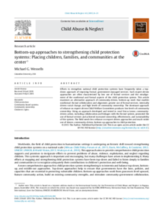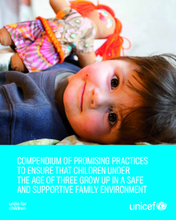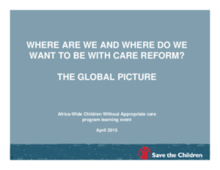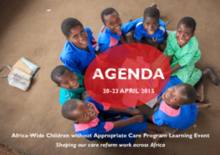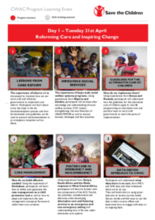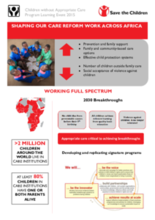Displaying 631 - 640 of 1025
This article examines an alternative approach to child protection which consists of community-driven, bottom-up work that enables nonformal–formal collaboration and alignment, greater use of formal services, internally driven social change, and high levels of community ownership. The article offers a case example of a community-driven program in Sierra Leone.
This Compendium is a compilation of the most encouraging initiatives in the area of prevention of child abandonment and relinquishment that have been implemented and tested in the CEE/CIS region.
In an effort to support practitioners to address some challenges of trying to undertake quality research, a group of child protection networks and organizations - the Community Child Protection Exchange, the CP MERG, the CPC Learning Network, and REPSSI - came together to produce this joint newsletter reflecting upon some groups’ successes and challenges working on child protection research and M&E, including working with a limited budget in low-resource settings.
This video briefly recaps the Africa-Wide Children without Appropriate Care Program Learning Event hosted by Save the Children in Addis Ababa, Ethiopia, on 20-23 April 2015.
This presentation was delivered at the Africa-Wide Children Without Appropriate Care Program Learning Event: “Shaping our care reform work across Africa,” held in Ethiopia on 20-23 April 2015. It provides an overview of the Tracking Progress Initiative, which includes the development of a tool to measure country progress in implementing the Guidelines for the Alternative Care of Children.
This presentation provides an overview of the status of care reform efforts in Africa. It identifies where care reform is underway as well as areas in which reform is still needed. The presentation looks ahead to what is needed to accelerate the momentum on care reform in the region.
Various stakeholders, including Better Care Network, met at an Africa wide Program Learning Event on 20-23 April 2015, organized by Save the Children, under the theme “Shaping our care reform work across Africa,” which brought together country, regional and global experts. This document includes the agenda for the 3-day event.
This document provides an overview of the topics covered in the various sessions during the three-day program learning event “Shaping our care reform work across Africa,” held in Ethiopia on 20-23 April 2015.
Various stakeholders, including Better Care Network, met at an Africa wide Program Learning Event on 20-23 April 2015, organized by Save the Children, under the theme “Shaping our care reform work across Africa,” which brought together country, regional and global experts.
This paper, presented at the XVI April International Academic Conference on Economic and Social Development in Moscow on 8 April 2015, outlines a research project analyzing ongoing foster care reform in Russia in the context of the country’s new family policies.

